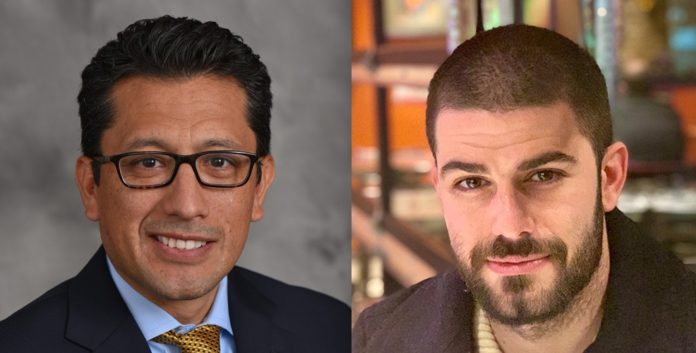
Research published by a Mercer professor and graduate student is shedding light on a hidden health–care issue.
The December 2018 issue of academic journal AIDS and Behavior featured a paper co-authored by Dr. Antonio Saravia, associate professor of economics and director of Mercer’s new Center for the Study of Economics and Liberty, and Robert Mueller, who graduated from Mercer in 2017 with a degree international business and is currently enrolled in Mercer’s online Master of Business Administration program.
The project, titled “Demand and Supply Motivations for Antiretroviral Drugs (ARVs) in Illicit Street Markets: The Case of Atlanta, Georgia,” received support from Mercer’s “Research that Reaches Out” Quality Enhancement Plan (QEP).
Mueller, who now works in Seattle, said he was an undergraduate student in Dr. Saravia’s international economics course when the project began. Dr. Saravia added a competitive twist to his term paper assignment: The students who wrote the two best papers would be mentored by a Mercer professor and present their research at a convention in Las Vegas.
Mueller wrote his paper on the HIV drug epidemic in Peru, won the contest and was paired with Dr. Saravia. They received good feedback at the conference, which spurred them to take the research further and look into the trade market in Atlanta for ARVs, drugs used to treat HIV.
They conducted a study involving low-income residents who were HIV positive and had recently purchased or sold HIV medicines on the black market. They received calls from 200 people who were interested in participating and interviewed 43 in downtown Atlanta over a three-day period, Mueller said.
The survey results revealed a vibrant black market and a vicious cycle: Nearly 50% of participants had sold ARVs to pay for personal needs, and nearly 21% had bought ARVs because they had previously sold them to pay for personal needs, Dr. Saravia said.
“They are doing this because they are balancing personal needs with the need to take the drug,” Dr. Saravia said. “The solution is not to suppress the black market or go after these people and criminalize them. As it is the case in other industries, black markets help people achieve their goals when the government imposes heavy regulations. The problem is deeper and more structural.”
The participants told Dr. Saravia and Mueller they didn’t have access to the Ryan White HIV/Aids Program that provides free medicine because they lacked proof of residence. So, they turned to the black market to try to find someone selling the drugs. Others sold their drugs to deal with financial hardships.
“It’s a very bleak picture of what’s going on in the streets there,” Mueller said. “I think there’s enough empirical evidence that shows there is an issue with the way we are (regulating) pharmaceuticals and how immense the impact is on the individuals who are unfortunate enough to have these diseases.”
The study raised awareness of something happening on a daily basis of which many people are unaware. People know about black markets for drugs like heroin and cocaine, but they are surprised to find out it’s also happening with ARVs.
“We worked with a lot of HIV patients who were so grateful that we were acknowledging the issue that’s going on and trying to do what we can to highlight it and help,” Mueller said. “The interviews and the feedback that we got and the hugs … it was just an emotional experience that I honestly wasn’t expecting at all.”
Dr. Saravia said the paper is getting a lot of attention, and people have been contacting him and asking him to present the findings. He and Mueller have already done so at two conferences, and Dr. Saravia hopes to present at a few more this year.
Mueller hopes they are able to continue the story at some point down the road or that other people will be inspired to continue to research this issue in some form.









